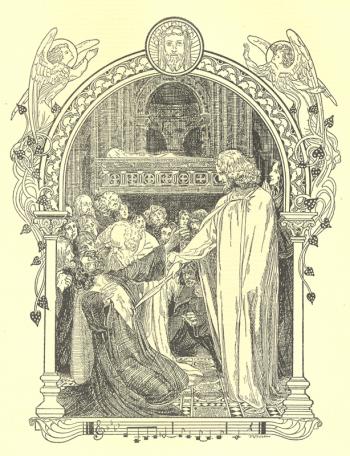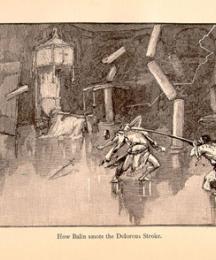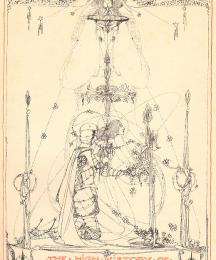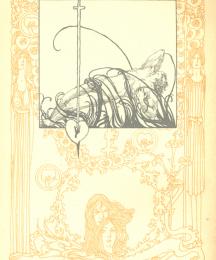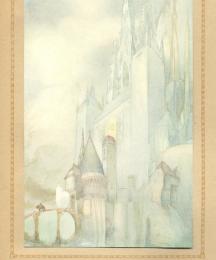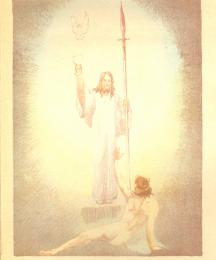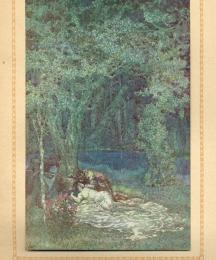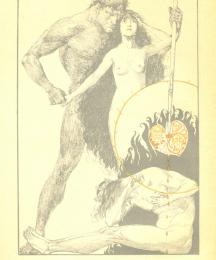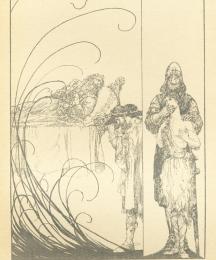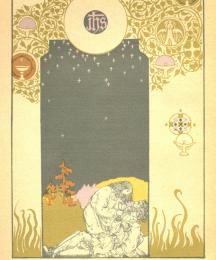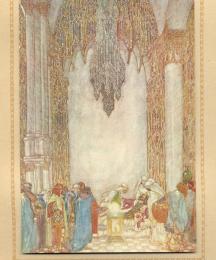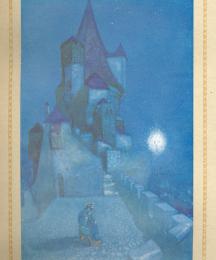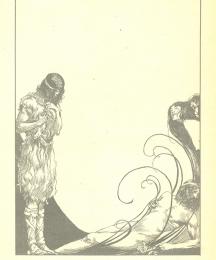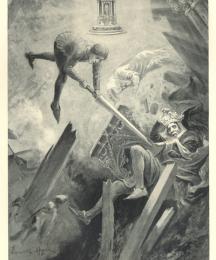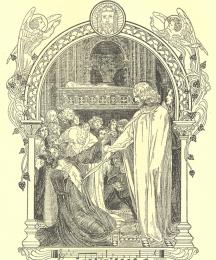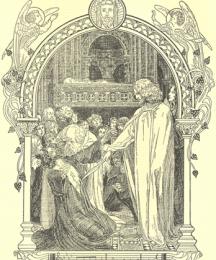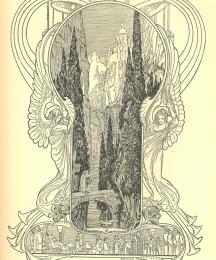The mysterious Fisher King is a character of the Arthurian tradition, and his story may sound familiar: suffering from wounds, the Fisher King depends for his healing on the successful completion of the hero's task. There are many different versions of the story of the Fisher King, and the character is not represented uniformly in every text. In the Middle Ages, Chrétien de Troyes'
Percival makes him a completely ambiguous figure, while Wolfram von Eschenbach provides him an elaborate background in his
Parzival. The Vulgate Cycle expands the Fisher King into multiple Maimed Kings, each suffering from some type of wound; yet Thomas Malory virtually ignores the Fisher King in his
Morte Darthur. Modern texts treat the Fisher King less as a character and more as a motif: T. S. Eliot incorporates the motif of the Fisher King into the desolated modern city and its people in his poem,
The Waste Land; in other modern texts, the Fisher King is embodied in a Vietnam War veteran, children in search of their fathers' identities, and the baseball coach of a team on a hopeless losing streak. The Fisher King also appears in various films, from Eric Rohmer's adaptation of Chrétien's
Perceval to Terry Gilliam's buddy comedy,
The Fisher King. In every version of the story, though, the Fisher King is completely helpless and depends on another to alleviate his suffering.
For an in-depth look into the Fisher King character, see Matthew Annis' student project
The Fisher King.
BibliographyCarman, J. Neale. "Was Pelles the Fisher King?" Romance Philology 3 (1950): 272-275.
Chrétien de Troyes. Perceval: The Story of the Grail [with the Three Continuations]. Trans. Nigel Bryant. Cambridge: D.S. Brewer, 1982.
Eliot, T[homas] S[tearns]. The Waste Land: A Fascimile and Transcript of the Original Draft. Ed. Valerie Eliot. New York: Harcourt Brace Jovanovich, Inc., 1971.
The Fisher King. Dir. Terry Gilliam. Screenplay by Richard LaGravenese. Prod. Debra Hill and Lynda Obst. Music by George Fenton. Tri-Star Pictures, 1991.
Krappe, Alexander H. "The Fisher King." Modern Language Review 39 (1944): 18-23, 280.
LaGravenese, Richard. The Fisher King: A Book of the Film. Introd. Terry Gilliam. Applause Screenplay Series. New York: Applause Theatre Book Publishers, 1991.
Lupack, Alan, and Barbara Tepa Lupack.
King Arthur in America. Cambridge: D. S. Brewer, 1999.
Nichols, Kathleen L. "Part IV: Healing the Fisher King."
Arthurian Legends Illustrated. 2003. Pittsburg State University. 26 Mar. 2008 .
Nitze, William A. "How Did the Fisher King Get his Name?" Mediaeval Studies in Honor of Jeremiah Denis Matthias Ford. London: Oxford University Press, 1948: 177-181.
——— "The Fisher King and the Grail in Retrospect." Romance Philology. 6 (1952-53): 14-22.
——— "The Fisher King in the Grail Romances."PMLA. 24.3. (1909): 365-418.
——— "Who Was the Fisher King? A Note on Halieutics." Romanic Review 33 (1942): 97-104.
The mysterious Fisher King is a character of the Arthurian tradition, and his story may sound familiar: suffering from wounds, the Fisher King depends for his healing on the successful completion of the hero's task. There are many different versions of the story of the Fisher King, and the character is not represented uniformly in every text. In the Middle Ages, Chrétien de Troyes'
Percival makes him a completely ambiguous figure, while Wolfram von Eschenbach provides him an elaborate background in his
Parzival. The Vulgate Cycle expands the Fisher King into multiple Maimed Kings, each suffering from some type of wound; yet Thomas Malory virtually ignores the Fisher King in his
Morte Darthur. Modern texts treat the Fisher King less as a character and more as a motif: T. S. Eliot incorporates the motif of the Fisher King into the desolated modern city and its people in his poem,
The Waste Land; in other modern texts, the Fisher King is embodied in a Vietnam War veteran, children in search of their fathers' identities, and the baseball coach of a team on a hopeless losing streak. The Fisher King also appears in various films, from Eric Rohmer's adaptation of Chrétien's
Perceval to Terry Gilliam's buddy comedy,
The Fisher King. In every version of the story, though, the Fisher King is completely helpless and depends on another to alleviate his suffering.
For an in-depth look into the Fisher King character, see Matthew Annis' student project
The Fisher King.
BibliographyCarman, J. Neale. "Was Pelles the Fisher King?" Romance Philology 3 (1950): 272-275.
Chrétien de Troyes. Perceval: The Story of the Grail [with the Three Continuations]. Trans. Nigel Bryant. Cambridge: D.S. Brewer, 1982.
Eliot, T[homas] S[tearns]. The Waste Land: A Fascimile and Transcript of the Original Draft. Ed. Valerie Eliot. New York: Harcourt Brace Jovanovich, Inc., 1971.
The Fisher King. Dir. Terry Gilliam. Screenplay by Richard LaGravenese. Prod. Debra Hill and Lynda Obst. Music by George Fenton. Tri-Star Pictures, 1991.
Krappe, Alexander H. "The Fisher King." Modern Language Review 39 (1944): 18-23, 280.
LaGravenese, Richard. The Fisher King: A Book of the Film. Introd. Terry Gilliam. Applause Screenplay Series. New York: Applause Theatre Book Publishers, 1991.
Lupack, Alan, and Barbara Tepa Lupack.
King Arthur in America. Cambridge: D. S. Brewer, 1999.
Nichols, Kathleen L. "Part IV: Healing the Fisher King."
Arthurian Legends Illustrated. 2003. Pittsburg State University. 26 Mar. 2008 .
Nitze, William A. "How Did the Fisher King Get his Name?" Mediaeval Studies in Honor of Jeremiah Denis Matthias Ford. London: Oxford University Press, 1948: 177-181.
——— "The Fisher King and the Grail in Retrospect." Romance Philology. 6 (1952-53): 14-22.
——— "The Fisher King in the Grail Romances."PMLA. 24.3. (1909): 365-418.
——— "Who Was the Fisher King? A Note on Halieutics." Romanic Review 33 (1942): 97-104.
Read Less
